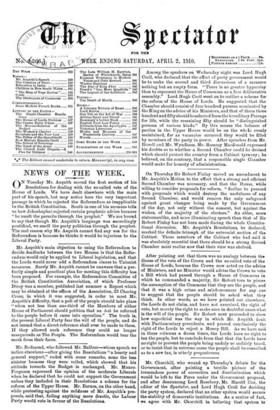After pointing out that there was no analogy between the
disuse of the veto of the Crown and the so-called veto of the House of Lords, because the Crown now acted on the advice of Ministers, and no Minister would advise the Crown to veto a Bill which had passed through a House of Commons in which he commanded a majority, Sir Robert tore to pieces the assumption of the Commons that they are the people, and that it was a high crime and misdemeanour for any one to suggest that the people should be asked what they think. In other words, as we have pointed out elsewhere. the Lords do not claim, and have not exercised, the right of veto, but merely the right to make sure in doubtful cases what is the will of the people. Sir Robert next proceeded to show how superficial was the way in which Mr. Asquith dealt with Parliamentary precedents, and proved conclusively the right of the Lords to reject a Money Bill. As we have said in these columns a dozen times, the Lords have no right to tax the people, but to conclude from that that the Lords have no right to prevent the people being unduly or unfairly taxed, or to insist that in extreme cases the people shall be consulted as to a new tax, is utterly preposterous.










































